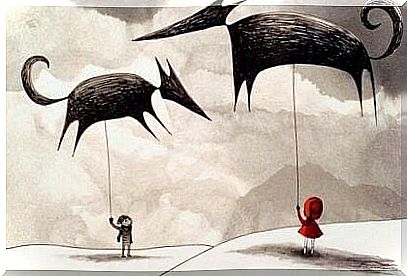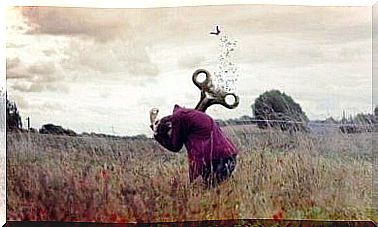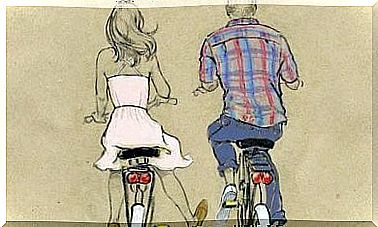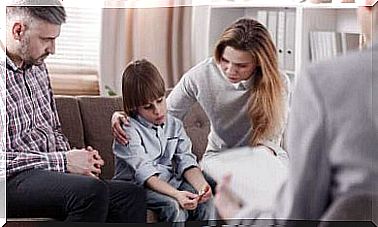How To Act When A Child Is Afraid
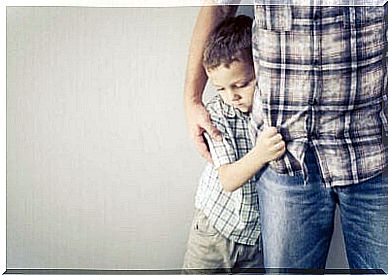
Imagine that you are watching a fantastic movie with your little boy. In principle, you have no doubts, since you have chosen a film for all audiences. However, suppose a strange being appears and your child is afraid of this thing. What do you do ?
You know this is only a movie, and what the child sees is not real. However, his understanding of the world and his ability to reason are far less than yours. Therefore, explaining to him that what he sees or hears is “not real”, and therefore not a threat, might be a valid option.
Now, suppose you explain to the child that what they are seeing is not real, but that they are still afraid. How can you act next? You can for example stop the film. However, remember that this fear can stay there, implied or explicit in his mind.
We used the example of a movie. But children’s fears can be very varied. It is common for them to appear at night, during the hours of darkness, when they have to sleep alone, for example. And so we could talk about the fear of strangers, of going out in the street… There are many and very varied according to each child.
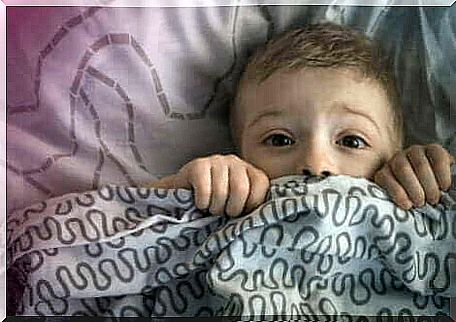
How to act when a child is afraid
Childhood fears are common. This is why it is necessary that the little one feels supported. It will increase his self-confidence and easily eliminate unnecessary fears. For this, the work of parents, teachers, caregivers, mentors, family members and educators is very important.
Avoid unnecessary fears
It is interesting not to frighten the little ones unnecessarily. Let’s avoid situations like the bogeyman… who will kidnap him if he doesn’t lie down, for example. Let us specify that the characters of a story, a film or a series are just that, characters invented without transcendence in reality, or at least with more transcendence than what we want to give them.
What to do if a child is afraid: do not underestimate their fears
Let’s not forget about empathy. We cannot judge the world with our adult capacity and have a child see it the same way. You have to show empathy, not minimize your problems and, above all, not to ridicule the child or make fun of him if a situation that is small for you seems terrifying to him.
Don’t increase his fear
If the child is afraid, it is important that we convey safety to him. It is best not to ignore her fears or lie to her. Sincerity and honesty will help the child not to suffer. As much as possible, we need to put the truth into perspective, so that he can see that he is not as fearful as he may have initially perceived.
What to do if a child is afraid: don’t force them to go through situations that frighten them
If the child is scared, putting him back in front of what terrifies him is usually not the best solution. In fact, we could achieve the exact opposite and make the fear more intense. This is why it is necessary that he does not have to watch a movie he does not want, face a meeting with a dog, go on a roller coaster or understand a macabre story, to quote. some common examples.
Don’t let your fear take over
It is also important that your own fears remain with you, and that they are not passed on to the little ones. If you think this can happen, you will need to face your fears to reduce them and prevent the child from experiencing them as well.
What to do if a child is afraid: do not scold him
When we see a child being afraid of something we consider stupid, we may make mistakes, such as calling it “cowardly”, “fearful” or “childish”. This is not a good idea, in fact, not only does it not help, but it makes him feel insecure and incomprehensible.
Don’t leave him alone
It is not good for the little one to have to face his fear alone. Being alone in a dark room could increase their anxiety and perpetuate this fear.
What to do if a child is afraid: do not amplify the fear
It is also not good to amplify the fears of the child. It is important that he understands that you understand them, but flaunting and exaggerated excess will make him believe that the danger is greater than he thinks.
Don’t ignore the child
Of course, don’t ignore it. Empathize, find the most logical way to explain the situation to him, and help him cope with the problem. We can judge the reality of the threat he fears, but not his fear – which is perfectly reasonable with his perception.
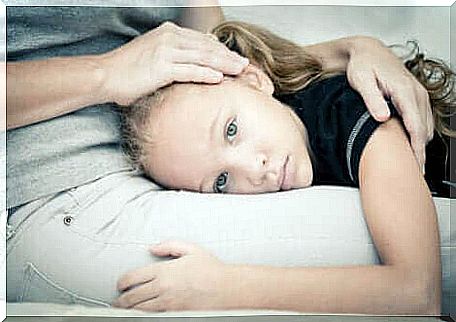
How to act?
In short, how to act when the child is afraid? Here are some ideas that can be put into practice to complement what has already been said:
- Empathy: As we have mentioned, it is important to speak to the child in a candid way, showing him that it is not bad to be afraid, but that it is possible to overcome it
- Support: offer your understanding and support and help him as much as you can
- Rationalization: when we talk to the child, we will rationalize the situation as much as possible
- Calm: we will stay calm, which will also help him calm down
- Union: be closer than ever so he knows you are there at all times during the trance
These concepts can help you know what to do when the child is afraid. Remember that if the situation persists, it is advisable to consult a specialist.
